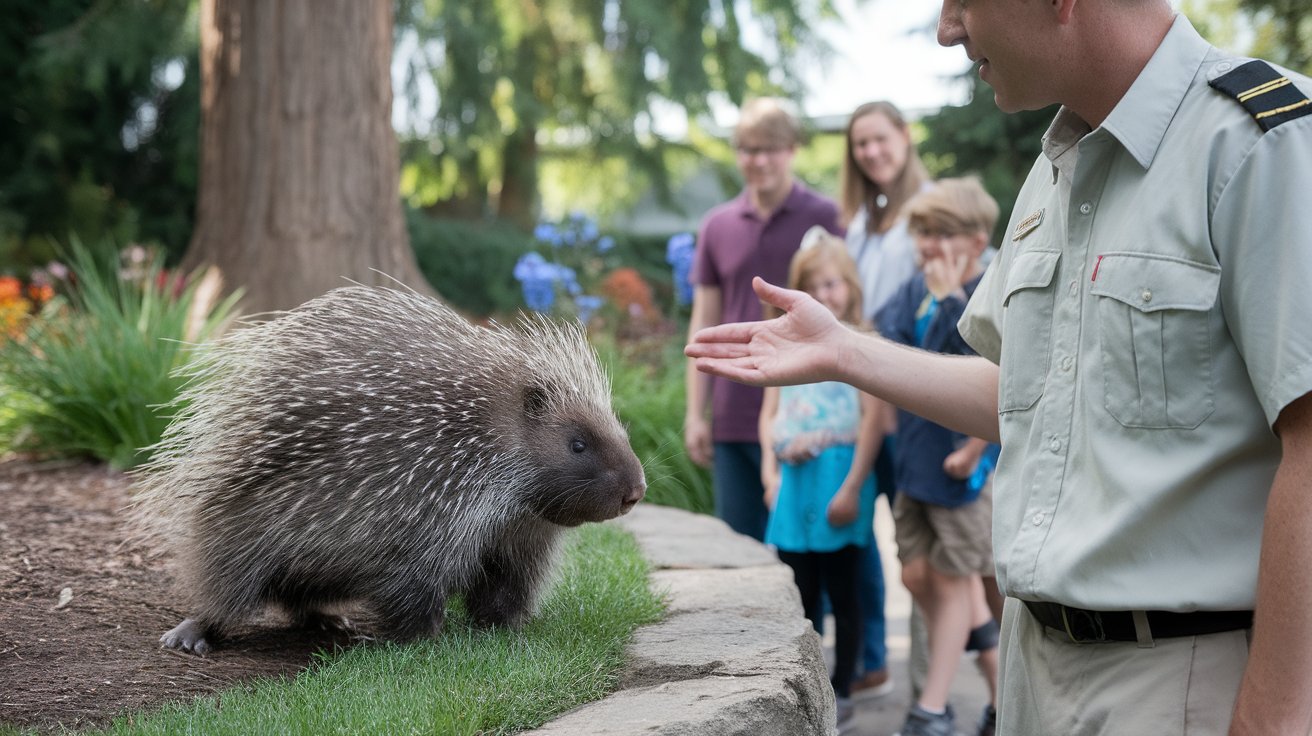Introduction
Leopard geckos, often regarded as one of the smartest reptiles, have intrigued pet owners and researchers alike with their surprising cognitive abilities. These little creatures, with their docile nature and inquisitive behavior, challenge many preconceived notions about reptilian intelligence. From recognizing their owners to reacting to specific stimuli, leopard geckos demonstrate an advanced understanding of their environment that goes beyond basic instincts. Their natural instincts and capability of learning suggest a unique form of intelligence not typically associated with reptiles.
Recent studies have further highlighted leopard geckos’ capacity to regenerate brain cells, opening new doors in understanding how brain function impacts intelligence in reptiles. As these intelligent reptiles continue to impress both pet owners and scientists, it becomes clear that their cognitive abilities are more complex than once thought. Through proper care, mental stimulation, and a healthy environment, their intelligence can be nurtured, making them not only fascinating pets but also important subjects for further research.
Key Takeaways
- Leopard geckos possess surprising cognitive abilities, including recognizing their owners.
- Their intelligence is shaped by both instinct and learned behavior.
- Proper nutrition and a well-maintained environment play a crucial role in enhancing their cognitive functions.
- Leopard geckos demonstrate problem-solving skills, especially in adapting to new environments.
- Recent studies highlight the gecko’s ability to regenerate brain cells, offering insights into reptilian intelligence.
- Continued research into leopard gecko cognition is reshaping how we understand reptilian intelligence.
Understanding Leopard Gecko Intelligence
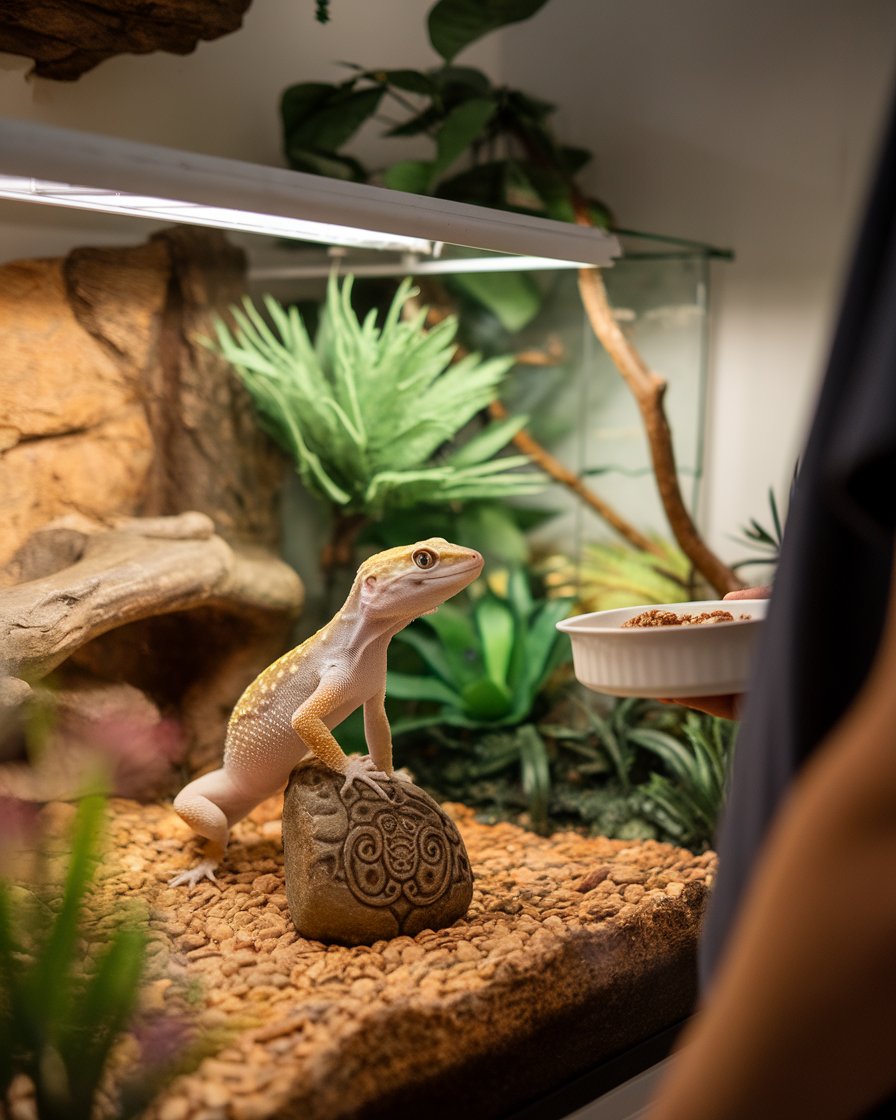
Leopard geckos are often seen as intelligent reptiles, surprising many with their cognitive abilities. While their brain size might be small compared to mammals, these little “leos” demonstrate remarkable learning capacity. They are capable of learning, recognizing their owners, responding to specific stimuli, and exhibiting behaviors that suggest an understanding of their environment. Unlike some reptiles, leopard geckos use instinctive yet learned behaviors to navigate their surroundings. This raises the question: what is the definition of intelligence in geckos? Geckos may not have the same brain size as a snake or mammals, but their level of intelligence challenges the common misconceptions about reptiles in general. For reptile enthusiasts, these geckos are among the smartest, offering a fascinating insight into reptilian cognition.
Recognizing Familiar Faces
Leopard geckos have the surprising ability to recognize their owners, something not commonly seen in reptiles. This recognition is not just a response to feeding but a deeper form of awareness. Geckos can associate familiar faces with positive experiences, like receiving food or gentle handling. While leopard geckos don’t express emotions in the same way as mammals, their behavior towards familiar people suggests an advanced form of recognition. For pet owners, this is a sign of intelligence, as it showcases how leopard geckos learn to trust and learn to associate specific actions with positive interactions. Although compared to humans their cognitive abilities are less developed, they demonstrate smartness in ways that are unique to reptiles, highlighting their potential cognitive capabilities.
Instinct Versus Learned Behavior
Much of a leopard gecko’s intelligence comes from the delicate balance between instinct and learned behavior. In the wild, their instincts drive their survival strategies, but in captivity, they show the ability to learn new things. This is seen in how they adapt to their owner’s routines, knowing when feeding times occur or where the best hiding spots are in their enclosure. While their instincts are vital, their capacity to learn from their environment further supports the idea that leopard geckos possess intelligence beyond basic survival mechanisms. This mix of natural instinct and learning makes them fascinating pets to observe.
Key Factors in Understanding Leopard Gecko Intelligence
1. Recognition of Owners
Leopard geckos have been observed to recognize their owners through consistent exposure. They respond to familiar voices, movements, and even the scent of their caretakers, showcasing their ability to form connections and identify individuals in their environment.
2. Adaptation to Environmental Changes
One of the strongest signs of leopard gecko intelligence is their ability to adapt to varying conditions in their enclosure or natural habitat. They learn quickly where the best hiding spots are or when feeding times occur, showing a capacity for learning routines.
3. Problem-Solving Behavior
Leopard geckos exhibit problem-solving abilities, particularly when navigating their enclosures. They figure out how to access food or move around obstacles. This behavior is a clear indication of their intelligence, as they learn and remember solutions over time.
4. Instincts and Learning Balance
While geckos rely on instinct, their ability to learn from experiences makes them stand out from other reptiles. They modify their behavior based on what they encounter, striking a balance between following instinct and acquiring new behaviors through learning.
Cognitive Abilities and Adaptability of Leopard Geckos
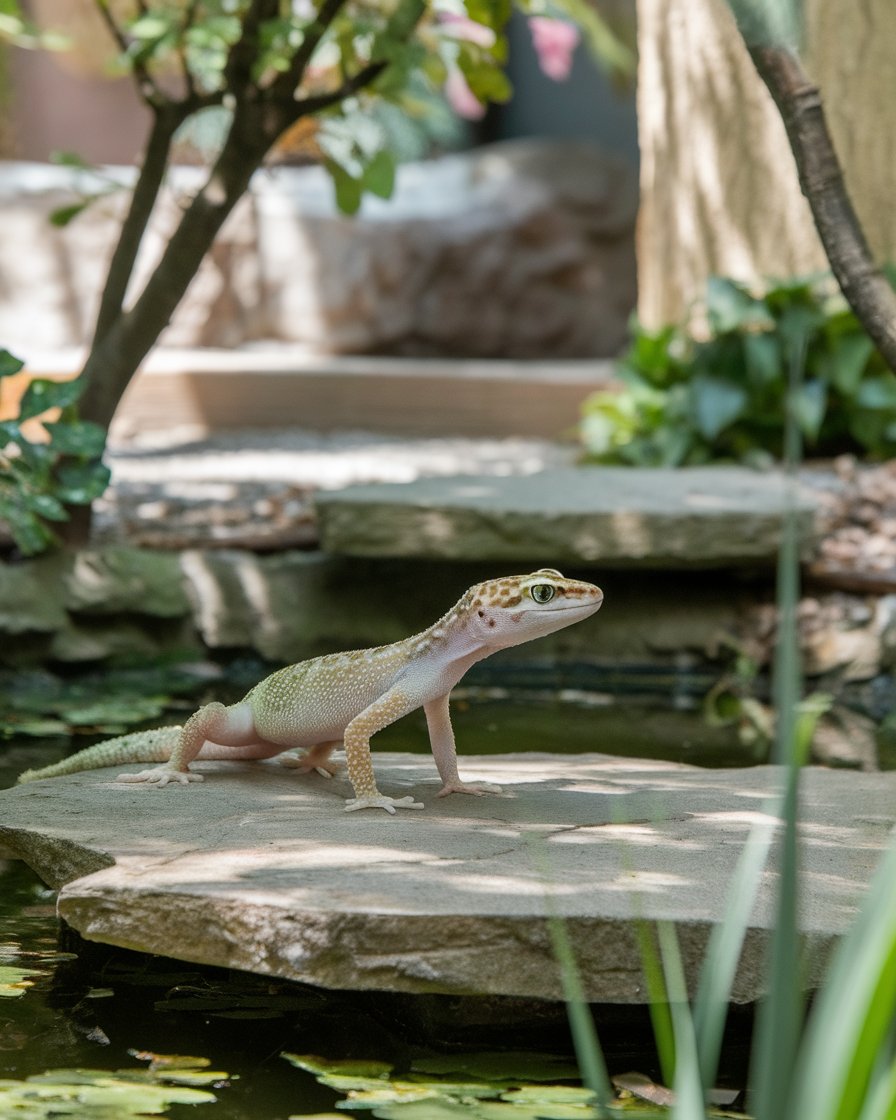
Leopard geckos have evolved to become masters of survival, thanks to their keen cognitive abilities. These little lizards, often regarded as leopard geckos smart, excel when adapting to new environments by utilizing both instinctual and learned responses. For instance, they can quickly assess potential threats, react accordingly, and even recognize patterns, like recognizing their owner. This ability to adjust and geckos learn tricks shows a distinct level of problem-solving that sets them apart from other reptiles. It also indicates that leopard geckos can regenerate brain cells, which enhances their cognitive skills over time. In the wild, their wild instincts are vital for avoiding predators in the wild and ensuring survival. Ongoing research indicate that leopard geckos possess unique intelligence, demonstrating how adaptable and geckos intelligent truly are.
Environmental Adaptability
Leopard geckos are remarkably adaptable to different environments, making them excellent survivors. In captivity, they quickly adjust to new enclosures, and in the wild, they modify their behaviors to suit changing surroundings. For instance, leopard geckos can respond to varying light and temperature conditions, using their natural instincts to regulate their body temperature and activity levels. This adaptability is a key indicator of their intelligence, as it shows an understanding of how to maximize their survival chances. By observing their ability to cope with environmental changes, it becomes clear that their cognitive skills are crucial to their survival strategy.
Problem-Solving in Captivity
One area where leopard geckos demonstrate clear cognitive abilities is problem-solving. They can figure out how to navigate complex enclosures or find ways to access hidden food. In some cases, they learn to recognize patterns, such as when certain sounds mean feeding time. This ability to process information and react accordingly is a testament to their intelligence. When presented with obstacles in their habitat, they show the ability to think through solutions, often surprising their owners with their quick adaptability and understanding of their environment.
Case Study: Environmental Adaptation in Captive Leopard Geckos
In a 2020 study conducted by reptile behaviorists, a group of 50 leopard geckos was observed in a controlled environment that simulated various changes in temperature, lighting, and habitat structure. The goal was to measure their adaptability and cognitive responses to these changes. Over a period of six months, the geckos demonstrated remarkable problem-solving skills.
When exposed to new feeding times or relocated hiding spots, the geckos quickly learned and adjusted their behaviors, showing clear signs of memory and learning. Some individuals even exhibited advanced responses, like recognizing specific patterns in feeding schedules. These results support the growing body of evidence that leopard geckos possess a unique form of intelligence that aids in their survival, both in the wild and captivity.
Health and Environmental Factors Influencing Gecko Intelligence
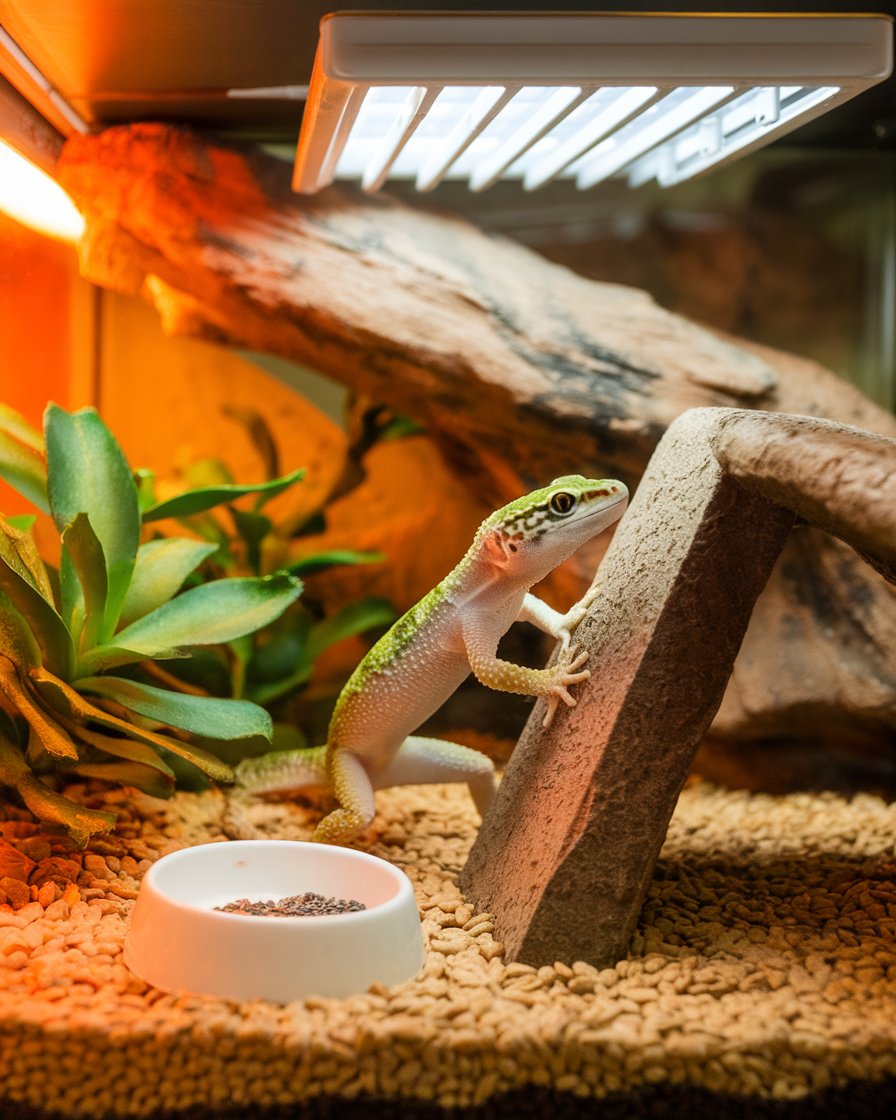
The cognitive abilities of leopard geckos are not solely determined by instinct but are also shaped by their environment and health. A proper habitat, with the right temperature, lighting, and diet, plays a crucial role in their brain function. Studies indicate that geckos can regenerate brain cells, making them a fascinating subject for further research into brain plasticity in reptiles. In captivity, the mental stimulation provided by a well-designed enclosure can promote social cognition and encourage leo geckos to develop smarter behaviors. Healthy geckos, properly cared for by their owners, can demonstrate heightened intelligence through problem-solving and recognizing familiar routines. Additionally, breed factors and environmental influences, such as pheromone signaling, can affect their behavior and ability to interact in their environment, enhancing their overall ability to understand new stimuli.
The Role of Nutrition in Brain Function
A leopard gecko’s diet significantly impacts its cognitive abilities. Proper nutrition, including calcium and vitamin D supplementation, is essential for healthy brain function. In fact, malnutrition can lead to neurological issues that affect the gecko’s ability to learn and respond to its environment. For example, geckos that are well-fed and receive adequate hydration tend to be more alert and responsive. By ensuring that their diet is balanced, owners can support their gecko’s brain health, leading to better cognitive functions like problem-solving and recognizing patterns. A healthy gecko is a smart gecko, and diet plays a crucial role in this.
Environmental Stimulation for Mental Growth
Providing environmental enrichment is key to boosting a leopard gecko’s mental capacity. Simple things like rearranging their enclosure, adding new hides, or providing puzzle feeders can stimulate their cognitive development. When leopard geckos are placed in a stimulating environment, they are more likely to engage in exploratory behaviors and exhibit signs of intelligence, such as remembering the locations of hiding spots or learning new routines. This mental stimulation helps them stay active and alert, enhancing their ability to process new information. Owners who regularly change their gecko’s environment often see positive changes in their pet’s behavior and intelligence.
“Intelligence is not a measure of how much we know but of how we adapt to the unknown.” — Dr. Jane Goodall
Research and Studies on Gecko Cognition
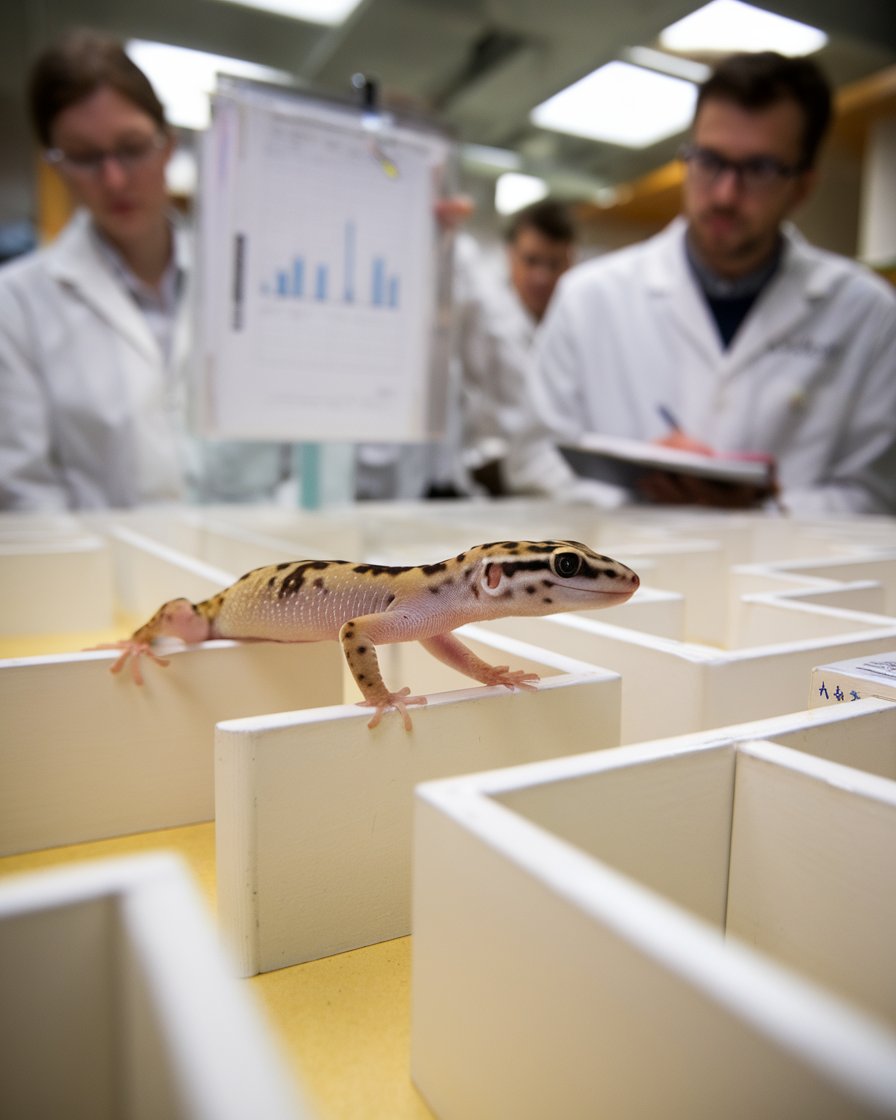
Recent studies have shed light on the complex cognitive abilities of leopard geckos. Researchers are discovering that these reptiles possess more intelligence than previously thought, particularly in how they interact with their environment and adapt to changes. One intriguing aspect is their ability to regenerate brain cells, which could hold the key to understanding reptilian intelligence on a broader scale. In fact, geckos are different from other reptiles in their cognitive capabilities. Geckos are smart and show unique traits that differ from mammals and birds. Their ability to recognize their owners and respond to stimuli supports the idea that gecko intelligence is more advanced than previously assumed. Furthermore, their spatial awareness plays a significant role in how they adapt to their surroundings, demonstrating just how indeed smart these reptiles can be.
Insights from Animal Cognition Experts
Recent studies from animal cognition researchers have revealed that geckos, including leopard geckos, have unique cognitive traits. These traits aren’t easily comparable to those of mammals or birds but showcase their intelligence in a different way. For example, geckos exhibit behaviors that suggest an understanding of cause and effect, such as pressing their noses against surfaces to find hidden food. Experts argue that while gecko intelligence is different, it is by no means inferior to other species. These findings encourage further research into reptile cognition, opening the door to a broader understanding of how intelligence manifests across different species.
Brain Regeneration and Cognitive Abilities
One of the most fascinating aspects of gecko cognition is their ability to regenerate brain cells. This capability raises questions about how brain plasticity might influence intelligence in reptiles. Studies have shown that geckos can repair and regenerate damaged brain tissue, a trait that is uncommon among most species. This regenerative ability could explain why leopard geckos, in particular, demonstrate behaviors that suggest higher cognitive functioning. As scientists delve deeper into how this brain regeneration affects cognitive abilities, leopard geckos stand out as an intriguing subject for future research in animal intelligence and brain function.
Conclusion
Leopard geckos, though small in size, possess intelligence that rivals many other reptiles. Their ability to learn from their environment, recognize familiar faces, and adapt to new situations highlights their cognitive prowess. This intelligence, coupled with their natural instincts, allows them to navigate both the wild and captive environments with ease. For pet owners, ensuring the proper care and providing mental stimulation can further enhance their gecko’s cognitive abilities.
Research into their unique traits, such as brain regeneration, continues to uncover new insights into reptilian intelligence. As scientists delve deeper into how leopard geckos and other reptiles process information, it’s becoming clear that their intelligence manifests in ways that were previously overlooked. Understanding these traits not only enriches the pet-keeping experience but also offers new perspectives on reptile cognition, paving the way for future studies on these fascinating creatures.



